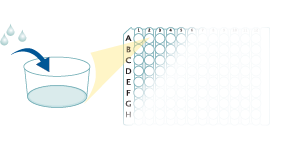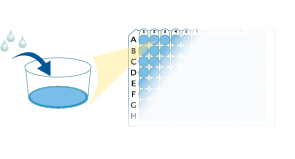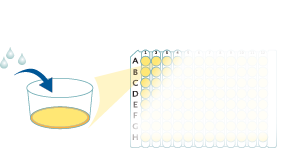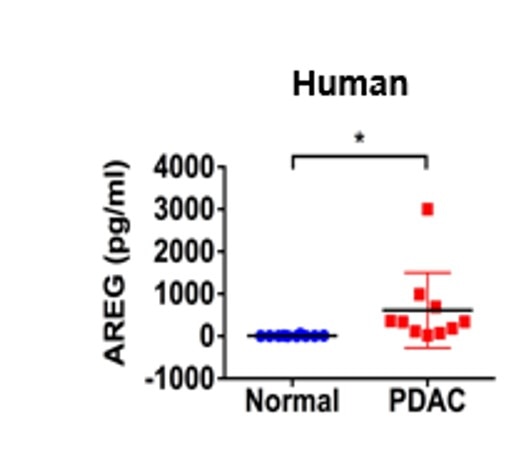Human Amphiregulin Quantikine ELISA Kit Summary
Product Summary
Precision
Cell Culture Supernates, Cell Lysates, Serum, EDTA Plasma, Heparin Plasma, Saliva, Urine
| Intra-Assay Precision | Inter-Assay Precision | |||||
|---|---|---|---|---|---|---|
| Sample | 1 | 2 | 3 | 1 | 2 | 3 |
| n | 20 | 20 | 20 | 20 | 20 | 20 |
| Mean (pg/mL) | 102 | 314 | 631 | 99.4 | 308 | 614 |
| Standard Deviation | 5.63 | 10.5 | 22.4 | 9.85 | 20.5 | 28.8 |
| CV% | 5.5 | 3.3 | 3.5 | 9.9 | 6.7 | 4.7 |
Recovery
The recovery of Amphiregulin spiked to levels throughout the range of the assay in various matrices was evaluated.
| Sample Type | Average % Recovery | Range % |
|---|---|---|
| Cell Culture Media (n=4) | 95 | 88-101 |
| EDTA Plasma (n=4) | 93 | 82-105 |
| Heparin Plasma (n=4) | 94 | 82-103 |
| Saliva (n=4) | 104 | 98-113 |
| Serum (n=4) | 95 | 85-103 |
| Urine (n=4) | 88 | 75-99 |
Linearity
Scientific Data
Product Datasheets
Preparation and Storage
Background: Amphiregulin
Amphiregulin (AR) is an EGF family growth factor that is released as a soluble protein following proteolytic cleavage of its transmembrane precursor. Amphiregulin is expressed by numerous carcinoma cell lines and epithelial cells of the colon, stomach, breast, ovary and kidney. It acts through ErbB family of receptor to stimulate the proliferation of keratinocytes, mammary epithelial cells, fibroblasts, astrocytes and glial cells. Amphiregulin can also inhibit the growth of certain tumor cells.
Assay Procedure
Refer to the product- Prepare all reagents, standard dilutions, and samples as directed in the product insert.
- Remove excess microplate strips from the plate frame, return them to the foil pouch containing the desiccant pack, and reseal.
- Add 50 µL of Assay Diluent to each well.
- Add 50 µL of Standard, control, or sample to each well. Cover with a plate sealer, and incubate at room temperature for 2 hours on a horizontal orbital microplate shaker.
- Aspirate each well and wash, repeating the process 3 times for a total of 4 washes.
- Add 200 µL of cold Conjugate to each well. Cover with a new plate sealer, and incubate at 2-8 °C for 2 hours on the benchtop.
- Aspirate and wash 4 times.
- Add 200 µL Substrate Solution to each well. Incubate at room temperature for 30 minutes on the benchtop. PROTECT FROM LIGHT.
- Add 50 µL of Stop Solution to each well. Read at 450 nm within 30 minutes. Set wavelength correction to 540 nm or 570 nm.





Citations for Human Amphiregulin Quantikine ELISA Kit
R&D Systems personnel manually curate a database that contains references using R&D Systems products. The data collected includes not only links to publications in PubMed, but also provides information about sample types, species, and experimental conditions.
18
Citations: Showing 1 - 10
Filter your results:
Filter by:
-
Identifying immune signatures of sepsis to increase diagnostic accuracy in very preterm babies
Authors: Das, A;Ariyakumar, G;Gupta, N;Kamdar, S;Barugahare, A;Deveson-Lucas, D;Gee, S;Costeloe, K;Davey, MS;Fleming, P;Gibbons, DL;
Nature communications
Species: Human
Sample Types: Plasma
-
EGF, TGF-? and Amphiregulin Differently Regulate Endometrium-Derived Mesenchymal Stromal/Stem Cells
Authors: Kamentseva, RS;Kharchenko, MV;Gabdrahmanova, GV;Kotov, MA;Kosheverova, VV;Kornilova, ES;
International journal of molecular sciences
Species: Human
Sample Types: Cell Culture Supernates
-
Luteinizing hormone stimulates the expression of amphiregulin in human theca cells
Authors: Y Liu, Y Zhong, X Shen, X Guo, R Wu, T Yang, M Chen
Journal of ovarian research, 2022-12-07;15(1):129.
Species: Human
Sample Types: Cell Lysates
-
iRhom2 regulates ERBB signalling to promote KRAS-driven tumour growth of lung cancer cells
Authors: B Sieber, F Lu, SM Stribbling, AG Grieve, AJ Ryan, M Freeman
Journal of Cell Science, 2022-09-08;0(0):.
Species: Human
Sample Types: Cell Culture Supernates
-
Amphiregulin can predict treatment resistance to palliative first-line cetuximab plus FOLFIRI chemotherapy in patients with RAS wild-type metastatic colorectal cancer
Authors: SA Kim, H Park, KJ Kim, JW Kim, JH Sung, M Nam, JH Lee, EH Jung, KJ Suh, JY Lee, SH Kim, JO Lee, JW Kim, YJ Kim, JH Kim, SM Bang, JS Lee, KW Lee
Scientific Reports, 2021-12-10;11(1):23803.
Species: Human
Sample Types: Plasma
-
Unraveling the differential impact of PAHs and dioxin-like compounds on AKR1C3 reveals the EGFR extracellular domain as a critical determinant of the AHR response
Authors: C Vogeley, NC Sondermann, S Woeste, AA Momin, V Gilardino, F Hartung, M Heinen, SK Maa beta, M Mescher, M Pollet, KM Rolfes, CFA Vogel, A Rossi, D Lang, ST Arold, M Nakamura, T Haarmann-S
Environment international, 2021-11-20;158(0):106989.
Species: Human
Sample Types: Cell Culture Supernates
-
Secreted matrix metalloproteinase-14 is a predictor for antifibrotic effect of IC-2-engineered mesenchymal stem cell sheets on liver fibrosis in mice
Authors: K Fukushima, N Itaba, Y Kono, S Okazaki, S Enokida, N Kuranobu, J Murakami, M Enokida, H Nagashima, S Kanzaki, N Namba, G Shiota
Regenerative Therapy, 2021-08-26;18(0):292-301.
Species: Human
Sample Types: Cell Culture Supernates
-
Pulmonary fibrosis distal airway epithelia are dynamically and structurally dysfunctional
Authors: IT Stancil, JE Michalski, D Davis-Hall, HW Chu, JA Park, CM Magin, IV Yang, BJ Smith, E Dobrinskik, DA Schwartz
Nature Communications, 2021-07-27;12(1):4566.
Species: Human
Sample Types: Cell Culture Supernates
-
Long-lasting severe immune dysfunction in Ebola virus disease survivors
Authors: A Wiedemann, E Foucat, H Hocini, C Lefebvre, BP Hejblum, M Durand, M Krüger, AK Keita, A Ayouba, S Mély, JC Fernandez, A Touré, S Fourati, C Lévy-March, H Raoul, E Delaporte, L Koivogui, R Thiébaut, C Lacabaratz, Y Lévy
Nat Commun, 2020-07-24;11(1):3730.
Species: Human
Sample Types: Serum
-
AREG mediates the epithelial?mesenchymal transition in pancreatic cancer cells via the EGFR/ERK/NF?&kappaB signalling pathway
Authors: L Wang, L Wang, H Zhang, J Lu, Z Zhang, H Wu, Z Liang
Oncol. Rep., 2020-02-27;0(0):.
Species: Human
Sample Types: Cell Culture Supernates
-
Targeting amphiregulin (AREG) derived from senescent stromal cells diminishes cancer resistance and averts programmed cell death 1 ligand (PD-L1)-mediated immunosuppression
Authors: Q Xu, Q Long, D Zhu, D Fu, B Zhang, L Han, M Qian, J Guo, J Xu, L Cao, YE Chin, JP Coppé, EW Lam, J Campisi, Y Sun
Aging Cell, 2019-09-07;0(0):e13027.
Species: Human
Sample Types: Serum
-
Yes-associated protein promotes the abnormal proliferation of psoriatic keratinocytes via an amphiregulin dependent pathway
Authors: J Jia, C Li, J Yang, X Wang, R Li, S Luo, Z Li, J Liu, Z Liu, Y Zheng
Sci Rep, 2018-10-15;8(1):14513.
Species: Human
Sample Types: Cell Culture Supernates
-
Combinations of Bevacizumab and Erlotinib show activity in colorectal cancer independent of RAS status
Authors: P Mésange, A Bouygues, N Ferrand, M Sabbah, AE Escargueil, A Savina, B Chibaudel, C Tournigand, T Andre, A de Gramont, AK Larsen
Clin. Cancer Res., 2018-02-28;0(0):.
Species: Human
Sample Types: Whole Cells
-
ErbB activation signatures as potential biomarkers for anti-ErbB3 treatment in HNSCC
Authors: D Alvarado, GF Ligon, JS Lillquist, SB Seibel, G Wallweber, VM Neumeister, DL Rimm, G McMahon, TM LaVallee
PLoS ONE, 2017-07-19;12(7):e0181356.
Species: Human
Sample Types: Cell Culture Supernates
-
Late acute graft versus host disease: a prospective analysis of clinical outcomes and circulating angiogenic factors
Blood, 2016-09-13;0(0):.
Species: Human
Sample Types: Plasma
-
Lipopolysaccharide (LPS)-Induced Biliary Epithelial Cell NRas Activation Requires Epidermal Growth Factor Receptor (EGFR).
Authors: Trussoni C, Tabibian J, Splinter P, O'Hara S
PLoS ONE, 2015-04-27;10(4):e0125793.
Species: Human
Sample Types: Cell Culture Supernates
-
Circulating hepatocyte growth factor is correlated with resistance to cetuximab in metastatic colorectal cancer.
Authors: Yonesaka, Kimio, Satoh, Taroh, Ueda, Shinya, Yoshida, Takeshi, Takeda, Masayuki, Shimizu, Toshio, Okamoto, Isamu, Nishio, Kazuto, Tamura, Takao, Nakagawa, Kazuhiko
Anticancer Res, 2015-03-01;35(3):1683-9.
Species: Human
Sample Types: Plasma
-
Endothelial cell-secreted EGF induces epithelial to mesenchymal transition and endows head and neck cancer cells with stem-like phenotype.
Authors: Zhang Z, Dong Z, Lauxen I, Filho M, Nor J
Cancer Res, 2014-03-31;74(10):2869-81.
Species: Human
Sample Types: Cell Culture Supernates
FAQs
-
Assay Diluent RD1-14 contains visible precipitate. Is this acceptable to use?
A small amount of precipitate is expected and acceptable in Assay Diluent RD1-14. Variability has been observed between vials and diluent lots. It may not fully resolubilize but this will not impact assay performance. It is not recommended to filter the precipitate.
Reviews for Human Amphiregulin Quantikine ELISA Kit
Average Rating: 5 (Based on 6 Reviews)
Have you used Human Amphiregulin Quantikine ELISA Kit?
Submit a review and receive an Amazon gift card.
$25/€18/£15/$25CAN/¥75 Yuan/¥2500 Yen for a review with an image
$10/€7/£6/$10 CAD/¥70 Yuan/¥1110 Yen for a review without an image
Filter by:









